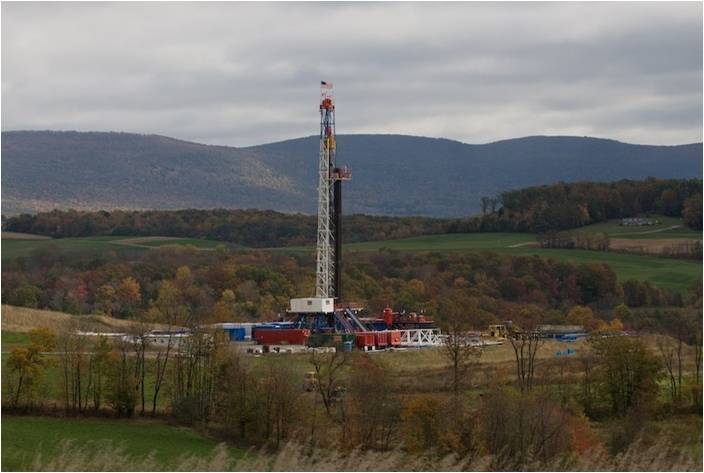INSTITUTE INDEX: Duke Energy's new climate plan has a fracked gas problem

A gas rig in the Marcellus Shale. Duke Energy is planning to transport fracked gas from the Marcellus to the Carolinas using the proposed Atlantic Coast Pipeline, but the company's new climate plan doesn't account for the project's greenhouse gas emissions. (Image from Penn State Outreach via Flickr.)
According to an updated climate plan released days before this month's Global Climate Strike, year by which North Carolina-based Duke Energy says it aims to achieve "net-zero" carbon emissions, suggested it will be still emitting carbon but offsetting it in some way: 2050
Of the top 20 power utilities nationwide, number that have now committed to achieving "net-zero" emissions: 3*
Year by which Duke Energy aims to achieve a 50 percent reduction in carbon emissions in the six states** where it operates: 2030
Percent reduction in the company's carbon emissions by 2030 called for by North Carolina Gov. Roy Cooper's draft clean power plan released last month: 60 to 70
Percent by which Duke Energy says it's already reduced its carbon emissions over 2005 levels, in large part by moving away from burning coal to burning fracked gas: 31
Number of its fracked gas infrastructure projects, such as the controversial Atlantic Coast Pipeline (ACP) carrying gas from West Virginia to the Carolinas, that Duke Energy accounts for in its new climate plan, according to the shareholder advocacy group As You Sow: 0
Number of coal-burning power plants it would take to match the annual climate pollution emissions from the ACP, which is currently tied up in court: 20
Number of times more potent methane, the primary component of natural gas, is than carbon dioxide in trapping heat in the atmosphere over the short term: 86
According to recent research from a clean-energy advocacy group, year by which more than 90 percent of proposed gas-fired power plants will be uneconomic to run compared to a clean energy portfolio: 2035
In its 15-year plan for the Carolinas that Duke Energy filed with regulators this month, percent increase in natural gas usage it calls for over last year's plan: 22
Number of gas-fired power plants Duke Energy currently operates in the Carolinas: 10
Number it intends to build: 30
Number of details Duke Energy's climate plan announcement included on how quickly the company plans to retire its remaining coal plants: 0
Year by which the Sierra Club's Beyond Coal campaign says all coal use must cease if we're to avoid the worst effects of climate change: 2030
In its most recent plan for closing its last coal-fired unit near the North Carolina town of Cliffside, year until Duke Energy said it intended to keep operating coal plants: 2048
Number of days after Duke released its new climate plan that it and other fossil-fuel interests sponsored a Southern States Energy Board meeting in Louisville, Kentucky, with one reporter noting that that gathering "blocked out the sense of urgency found in the scientific consensus on climate change": 7
* Besides Duke Energy, they are Minnesota-based Xcel and PSEG of New Jersey.
** Florida, Indiana, Kentucky, North Carolina, Ohio, and South Carolina.
(Click on figure to go to source.)
Tags
Sue Sturgis
Sue is the former editorial director of Facing South and the Institute for Southern Studies.
